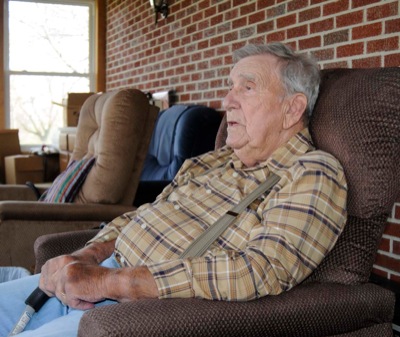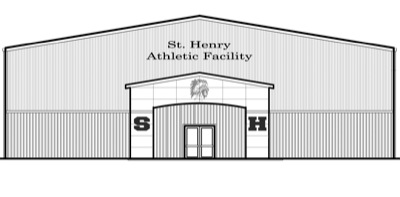Tuesday, November 11th, 2014
Local vet recalls terrible aftermath of Hiroshima
Kaup worked with Gen. MacArthur during WWII
By William Kincaid

Photo by William Kincaid/The Daily Standard
Adrian Kaup recalls his time in Japan serving with the Army in Tokyo after the atomic bombing of Hiroshima and Nagasaki. The Fort Recovery man operated the communication system that allowed Gen. Douglas MacArthur to speak with President Harry Truman.
FORT RECOVERY - In the span of a year, Adrian Kaup went from working on the family farm in St. Peter and playing infield for the Coldwater Cavaliers baseball team, to seeing with his own eyes the horrific aftermath of the atomic bombing of Hiroshima, Japan.
"That Hiroshima ... when you go around the bank at Celina in the spring of the year and see all those dead fish, that reminded me of the bodies out there. There were just bodies every place out there in that bay," Kaup, who will turn 88 on Sunday, said.
The day before Veterans Day, sitting on a recliner in the rear addition of the home he built on state Route 119 in 1950, Kaup recounted to the newspaper the time he spent in Japan from 1945 to 1946 as a member of the U.S. Army Signal Corps - and the terrible costs of war for all involved.
After graduating from Coldwater High School in 1944, Kaup, one of five siblings born to John and Mary Kaup, enlisted in the U.S. Army. He arrived in Japan on a troop carrier as part of a nine-vessel fleet, including an aircraft carrier and minesweepers, to serve with the 71st Signal Corps in Tokyo after the atomic bombing of Hiroshima and Nagasaki but before the surrender of Japan.
One day, out of curiosity, Kaup and some other men took a jeep to view the aftermath of Hiroshima. The men drove past the devastated city without stopping, Kaup said.
"It wasn't good. I tell you it was sad," he said. "Unbelievable. Down the road, we probably saved a lot of lives."
Kaup, his eyes tearing up with remembrances of things past, described the city as a big pile of ashes with building parts scattered about.
"There was nothing there, absolutely nothing there," he said.
One image of the flattened city sticks out in Kaup's memory: A handprint in a twisted steel girder.
"That's how hot that got. You just can't imagine what you could all see over there ... terrible," he said.
Kaup was assigned to the Daiichi Building in Tokyo, located across the street from the Emperor's Palace, where he operated the longline communication system that allowed U.S. Gen. Douglas MacArthur to speak with President Harry Truman.
"I was kind of a switchboard operator," Kaup said. "That way they could talk back and forth."
On a daily basis, he worked with MacArthur, whom he described as a really good guy.
"He'd always say, 'good morning, son, good afternoon, son.' Everybody was son to him, and he'd pat you on the head a lot of times. He was a big man, smoked that corncob pipe all the time. You'd never see him without that corncob pipe."
Once, Kaup spoke with Truman, who asked Kaup how he was being being treated in Japan.
"I said, 'fine.' What are you going to say?" Kaup said. "You just don't know what you want to say. It's hard to come up with something."
He also spoke with Gen. George Patton.
"At one time, Old Blood and Guts come over. Old Patton, he came over, and (it was) day and night," Kaup said. "MacArthur, his language, he wouldn't say, 'darn it.' Patton came over there, one curse word after another. Just the complete opposite of generals."
Patton talked to Kaup about looking forward to getting back home.
"He wasn't any different than the troops," Kaup said. "We just talked about getting back to the states."
The Daiichi Building where Kaup worked was armed with machine guns on the roof, the third floor and the ground level, Kaup said.
Tokyo was deserted as its people fled to the hills, fearing an atomic bomb, Kaup said.
"We went into Tokyo, and we were there six days before I saw my first Japanese," he said. "We had no idea what they looked like. These people just left the city. I mean the cities were bare."
Doors were left open, even those of a jewelry store, Kaup said.
From the coast of Yokohama, Kaup watched a Japanese boat on Sept. 2, 1945, take off toward the USS Missouri to surrender.
"They came down this coast and they went to the Missouri and then they had their white flags and they got them up on the Missouri and they signed their peace treaty," Kaup said.
After Japan surrendered, the people eventually came back to the city, Kaup said.
"When they finally found out nobody was going to hurt them and word got spread, I guess, that there were no more bombs going to be dropped. Then they automatically all just came back," he said.
But some Japanese resisters hiding in bunkers refused to surrender and had to be taken out by American troops, Kaup said.
Kaup eventually came back to the United States. In Marysville, Calif., he was given his discharge papers.
"I got $80 mustering-out pay, and ... I got $28 a month, that was our service pay," he said.
Kaup took a train to Chicago before getting on a bus to St. Marys, where his uncle Ted picked him up and brought him home to St. Peter.
He remembered coming home after spending two years in war-ravaged Japan.
"Unbelievable. You just can't help but think how good we've got it," he said. "Us people ought to be tickled to death for what we have, I think. People don't appreciate what we have. It was quite an experience to come back."
Kaup worked on the family farm for a year before moving on to New Idea, where he welded for 43 years, and served as the Mercer County animal control officer for 30 years. He and his wife, Bernice, have five children, 11 grandchildren and three great-grandchildren.

